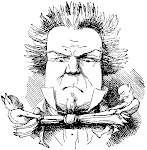Since the Minister of Finance, Micharl Cullen, announced the re-nationalisation of the rail network we’ve seen the spin doctors attempting to decry the decision.
The spin has seen the re-emergence of the Tweedledum and Tweedledee of the Right - the Business Round Table, in the shape of Roger Kerr, as the spokes-body for those who want to privatise all the State activities in the interests of “the market” and the tired attack dog of ACT, Richard Prebble.
Along with Tory Press release regurgitators these critics of the decision have all chosen to repeat the now largely discredited advice of the 1980s Treasury employees who argued that the market would provide efficiencies through competition and self interest. It did. The self interest resulted in the asset stripping of the resource, a rapid transfer of funds off shore to Wisconsin and to the other investors in the purchase and a rapid rundown of the enterprise until it could be dumped into someone-else’s lap.
The Treasury advisors also informed the Bolger Government that the Rail network was inefficient because the distances between key points was too short, that the narrow gauge track the geography of the country forced on the builders was inefficient and that, of course, running a railway was not part of the “core business” of a nation’s government and so it was sold.
The apologisers for the advice and decisions now chorus that the market has demonstrated their “truths” and, for good measure, that it is a myth that rail is environmentally friendly - especially if the production of the trains and the use of trucks to transport goods from the rail head to the final destination is taken into account.
Interestingly there is more material that proves these advocates of asset stripping wrong. The Energy Efficiency and Conservation Authority (2000) report provided data that showed that road transport was inefficienct in that it used 3,000,000 units of energy to move 1 tonne of goods one kilometre whereas rail, even taking into account the energy used by the trucks moving goods from the rail head to its final destination, only took 0.61 million units of energy to move the equivalent tonne a kilometre.
The costs of building the trains as compared to he costs of building trucks is, according to European research, three times less. That is road transport is less energy efficient than rail transport even taking into account the costs claimed by Richard Prebble.
The decision to re-nationalise the rail network needs to be seen in the context of rapidly rising petrol & oil prices and the consequent rise in long distance road transport costs which, along with the increasing costs the heavy vehicles cause on the roading infra-structure demonstrate the need to have a viable national alternative available to efficiently and relatively inexpensively move resources and products around the country. The combination of research and the realities of ever increasing energy costs make the long term planning of this decision a wise one and renders the contortions of the spin doctors meaningless.
10 May 2008
Subscribe to:
Post Comments (Atom)


No comments:
Post a Comment